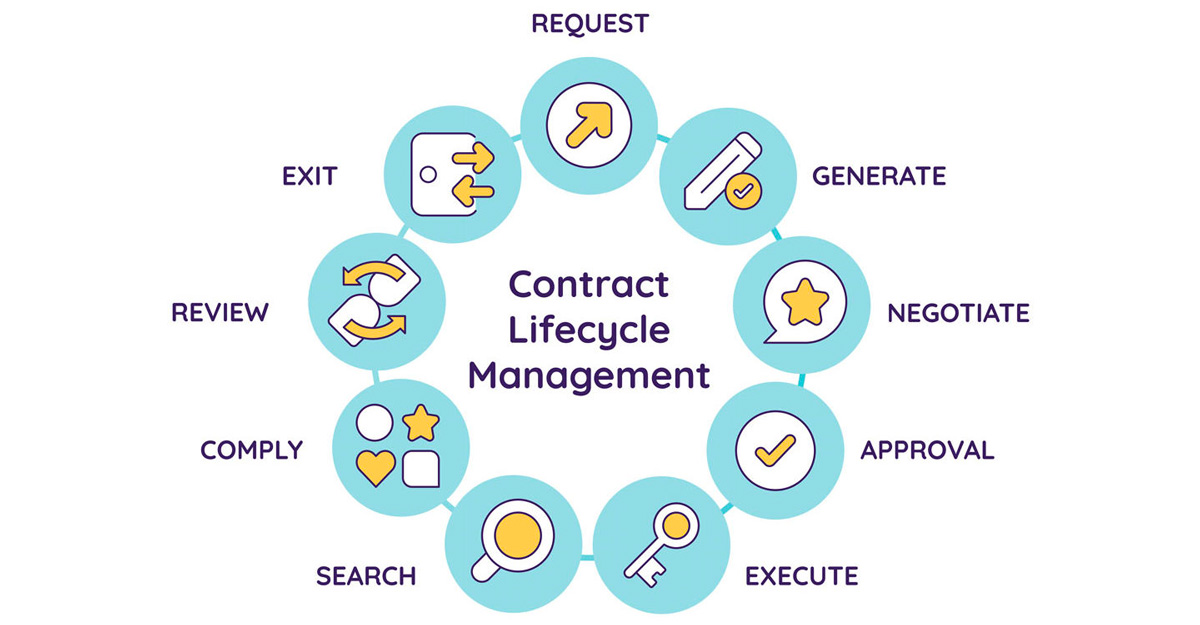Contract management is about more than just renewing deals and establishing project parameters. It’s about ensuring your business stays compliant and minimizes any risks from both financial and legal perspectives. Contract lifecycle management (CLM) software not only helps organizations significantly reduce risks and stay compliant but also improves efficiency and cost savings. Learn more about CLM and why it’s an essential tool for businesses managing any significant volume of contracts.
What Is Contract Lifecycle Management?
CLM is a software solution that manages a contract from initiation through its renewal stage. Stages can include creation, review, approval, execution, and expiration. The typical contract lifecycle begins when a business or customer requests a service or product. The lifecycle concludes upon delivery or receipt of that service or product.
CLM automates many processes at each stage in a contract life cycle. It helps with any type of contract, from suppliers to customers and variations in between.
Why Contract Lifecycle Management? The 7 Major Benefits
In-house legal teams, outsourcing teams, and sales teams have historically been burdened by both time and manual processes when managing contracts. But CLM relieves many of the tedious tasks required throughout a contract’s lifecycle – enabling all teams to contribute to higher-value initiatives. CLM produces ROI in seven specific ways:
Version Control
Contract negotiation always involves some level of back-and-forth between two or more parties. Even the smoothest negotiation involves more than one signature. Add complexity to a negotiation, and a contract document now has multiple versions and rounds of revision. CLM enables you to easily track versions of a contract, so you’re always working with the most up-to-date version, and you can go through version history to see what changes were made.
Real-Time Collaboration
Nothing slows down a contract process like paper. Contract stages can take forever when multiple parties have to physically receive documentation, review, approve, and move it along. CLM moves this process to an electronic system to enable your teams and external parties to collaborate more effectively on documents in real-time. You’ll shorten the contract’s lifecycle in a few stages.
Better Security
Contracts aren’t always single documents that you can press “save” on and know your data is secure. There are often multiple attachments and files exchanged during a contact’s lifecycle that also need proper security. CLM provides safe storage and can automatically integrate with your email provider or use more advanced technology like file sync and sharing and electronic signature to get documents to the right people in a secure manner.
Accessible Templates
Templated clauses and contract libraries are essential for your team’s efficiency, and CLM helps them easily manage those templates. Your team’s pre-approved clauses and documentation in a central repository help teams establish formal processes that speed up contract lifecycles and always ensure the most recent versions of templates are being used. A structured CLM process will emphasize the data collection as contract requests are created and workflows are processed, then inserting the approved data (header, clauses, executive summary, etc.) into the appropriate template without user intervention.
Advanced Analytics
Your team will have a global view of all your active contracts and will easily be able to pull data on the status of other contracts. When it comes time to report on where contracts are in their lifecycles, your teams won’t waste time manually searching for statuses and creating reports. Reporting dashboards will provide a graphical interface (charts, pies, gauges, cards, maps, etc.) along with related data grids in real-time that allows users to drill down to the contract request, contract record, and contract document as needed. These dashboards are sharable internally and externally using automated delivery or manual delivery.
Risk Avoidance
CLM helps you stay compliant and fulfill your contractual obligations – leaving no loopholes for litigation. It also enables you to avoid payment errors that incur fees or penalties.
Automating Approvals
Another way CLM reduces compliance risk is by automating your contract approval process. No matter how complex the approval process is – or how many teams need to be involved – CLM streamlines the process for both the approver and the requester, so your contracts always go out with the proper approval.
Interested in how contract lifecycle management can improve your bottom line? Contact All Star today to learn more about what you’ll get out of this solution.






